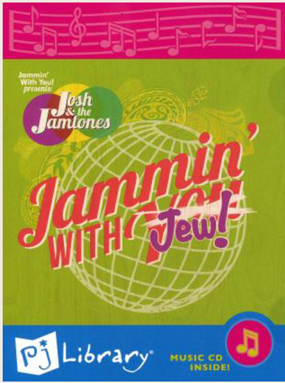
Not long ago, on an otherwise average weeknight as I readied the kids for bedtime, I noticed our monthly blue and white PJ library package lying on the kitchen counter, unopened. Expecting a new book inside, I promised the kids that if they washed up quickly, we’d end the night with a brand-new story. But instead, when we ripped the package open, we found a CD:
Jammin' with Jew-- a “funky blend of ska, reggae, and rock music with family-friendly Jewish content, from basic Hebrew to Jewish Holidays,” recorded in 2013 by Josh and the Jamtones.
I promised the girls we’d listen to it on the way to school the next morning.
Fast-forward two months. We’ve listened to
Jammin' with Jew every morning. From the minute my kids are strapped into their car seats, the tiny request comes from the back: Can we listen to
Jammin' with Jew? (The humor in the title is lost on them. This album is serious business to my kids.)
We have not been to a Shabbat morning service in a while, but thanks to this CD, my kids have learned the words to
modeh ani, the morning prayer of thanks. As I drive down a local side street on the way to drop them at nursery school and hear their small sweet voices sing about being grateful and content as the sun comes up, I’m pretty well aware that this is as important a piece in their Jewish education puzzle as any more formal endeavor we might engage in.
This is a relief, because like so many parents, I worry about their Jewish identity and development. I grew up in Jewish day school, spent my summers at Jewish sleep-away camp. For my husband Jonathan and me, Hebrew language is a second skin. We can follow along with and participate in just about any Jewish prayer service. We have a working knowledge of the Bible. We spent a lot of time in Israel. The works.
Still, we struggle, question, and wrestle with what we want our own family Judaism to look like. For various reasons, we don’t plan to send our own children to Jewish day school. And yet: We want them to learn Hebrew. We’d like them to have the prayer-book basics, so that they can follow along in a Shabbat morning service (should we ever be able to make it to one). We want them to understand and value ethical conduct, and it would be nice if they had some spirituality in their lives, too.
But the thought of being single-handedly tasked with our kids’ Jewish cultural, religious, and spiritual development is overwhelming. And so, the worry emerges: How many synagogue services and days of afternoon religious school must they attend? When should we take the kids to Israel? How much discussion of
tzedakah should we lead? What must we do to ensure that our kids know the pleasure of a deeply warm and affecting Jewish foundational start, just as we did?
Here’s a little secret: sometimes the answer is as simple as listening regularly to a CD of Jewish kids music.
Ok, maybe that’s an oversimplification. But hear me out:
My kids are at an age right now—in the final months of preschool—when they so eagerly, unselfconsciously, and earnestly absorb it
all. What’s interesting is that as I age, I become less self-conscious and more earnest right along with them. For so many years I rejected the more traditional elements of my Jewish self and went searching for something more modern and appropriate for who I thought I was becoming. Now, I hear my kids singing along to Josh and Jamtones and I am genuinely filled with happiness; I am so glad to be singing with them, to share this essential piece of identity with them, unburdened by how I’ll explain God to them or if they will turn into the “kind” of Jews I think they should be. In these moments, we are beyond the questions and the worry. We’re just looking out the window and singing and it feels great.
Next year, my children will be off to kindergarten and I know that their open, curious, receptive Jewish selves won’t flourish without cultivation. The responsibility is on us.
But maybe it doesn’t have to be all that complicated. Sure, there will be big decisions down the pike; what Judaism means to my husband and me continues to evolve. The significance of our faith—what it truly means to belong and believe—will continue to change, on and on without stopping, as it should. Our kids will be along for this ride with us, and ultimately, they’ll make their own choices. Worrying over it won’t help.
Instead, we can try and infuse the present with meaning, as often as possible. Music is one of the easiest ways to do that. Music moves us beyond ourselves, beyond our brains, into a liminal space where memories are imprinted, hearts grow, and souls gladden. Singing beautiful Jewish melodies with my kids makes us happy. That seems like enough for now.
About the author: Adina Kay-Gross is a contributing editor for Kveller.com. She is also the Editorial Director at The Covenant Foundation and a Writing Consultant at Hebrew Union College-Jewish Institute for Religion. Adina earned an MFA in nonfiction writing from Columbia University and has been published in a number of literary magazines as well as in Slate, Tablet, The Jewish Week and The Forward. She lives in the suburbs of New York with her husband Jonathan, her twin girls, and her dog, Pretzel.
March 1, 2016